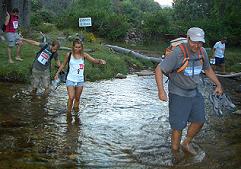FORD
The etymology of ford refers us to the Latin language: vadus . The term is used to name the site of a watercourse that, thanks to its shallow depth and stable bottom, allows passage .

For example: "We have been walking for more than two hours and we still have not found any fords: I don't know how we are going to cross the stream" , "The route crosses a shallow ford, which you can pass without problems" , "The truck got stuck in a ford ” .
The fords can be of natural origin or be developed by man to allow transfers . There are fords in streams and rivers that can be crossed on foot, on horseback, or on a vehicle (car, truck, truck, motorcycle, etc.).
The concept, however, also has other meanings. Called ford to the work that is done on public roads to allow vehicles to access a garage or other space : "I am waiting for the municipality to grant me permission to make the ford so I can start using the garage" , "Sir, it is forbidden to park next to this ford as vehicles enter and exit here . "
Specifically, once the person in question has the necessary authorization to be able to undertake what is the construction of the ford, then they must perform another function. You will have to indicate by means of the corresponding mark or sign that it is a ford for which the city council is being paid and that, therefore, it is absolutely forbidden to park the vehicle in that place.
Thus, for example, if someone, for whatever reason, decides to park their car in the ford, whoever is paying for it may contact the authorities directly so that they can appear at the place and proceed to take him away by Crane.
The sector of the sea where boats can anchor is also called a ford: "Let's find a ford to spend the night and then we will continue the trip" , "As soon as I find a ford, I will anchor the boat . "
In the same way, we cannot forget that there are different populations scattered all over the world that also use the term ford in their names. Specifically, among the most significant are the following:
-Vado. It is a Spanish hamlet that is located in the province of Palencia and that belongs to the municipality of Dehesa de Montejo. It has about 30 inhabitants, approximately according to the latest data collected, and offers the visitor several attractions. Specifically, among these are the Gothic Church of San Sebastián, its small spring, the anthropomorphic tombs found and the rock hermitage of San Vicente.
-Los Vados, which is a town that belongs to the municipality of Arenas (Málaga).
-Vado Real, Colombian population belonging to the municipality of Suaita. Its economy is fundamentally based on what is livestock and the cultivation of sugar cane and coffee.
According to the dictionary of the Royal Spanish Academy ( RAE ), ford is also the becoming that allows the development of something: "I promise you that I will give up to this matter as quickly as I can . "
Comments
Post a Comment